Backyard Beekeeping for Beginners
In this series, backyard beekeeping for beginners, I hope to share some important things to think about before beginning the journey into keeping bees.
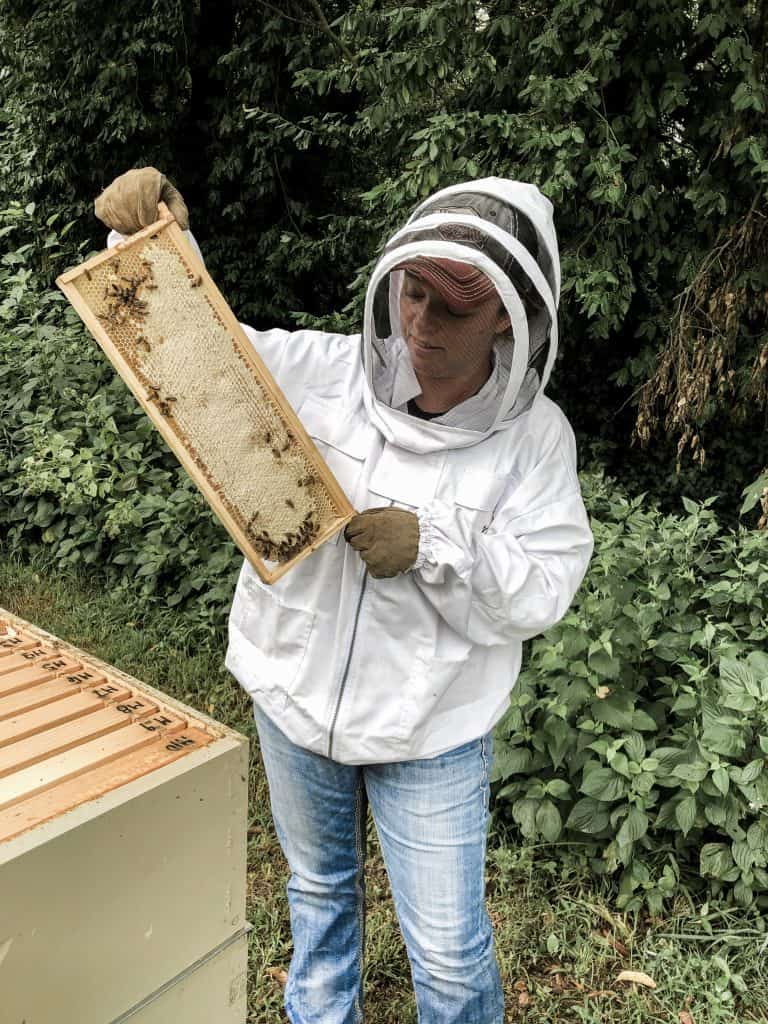
How I Started Backyard Beekeeping
I began beekeeping in May of 2018, although my studying about bees began much earlier. I had a desire to keep honeybees for quite a long time but there was such a vast amount of information, and it all felt overwhelming. In the first part of the series, backyard beekeeping for beginners, I hope to share some of the thoughts that I think anyone choosing to keep bees should think about.
My journey into beekeeping began when I saw a sign, “local honey for sale” as I was driving down the road. I decided to turn down the side road to see where I could purchase some honey. Not only did I purchase honey but I ended up spending quite a while talking to the beekeeper at her home. During our conversation, I found out she has been keeping bees for over 15 years and believes in natural beekeeping, which is exactly what I wanted to do. I also soon found out that she would be selling nucs later in the season, and I decided right then to place an order.
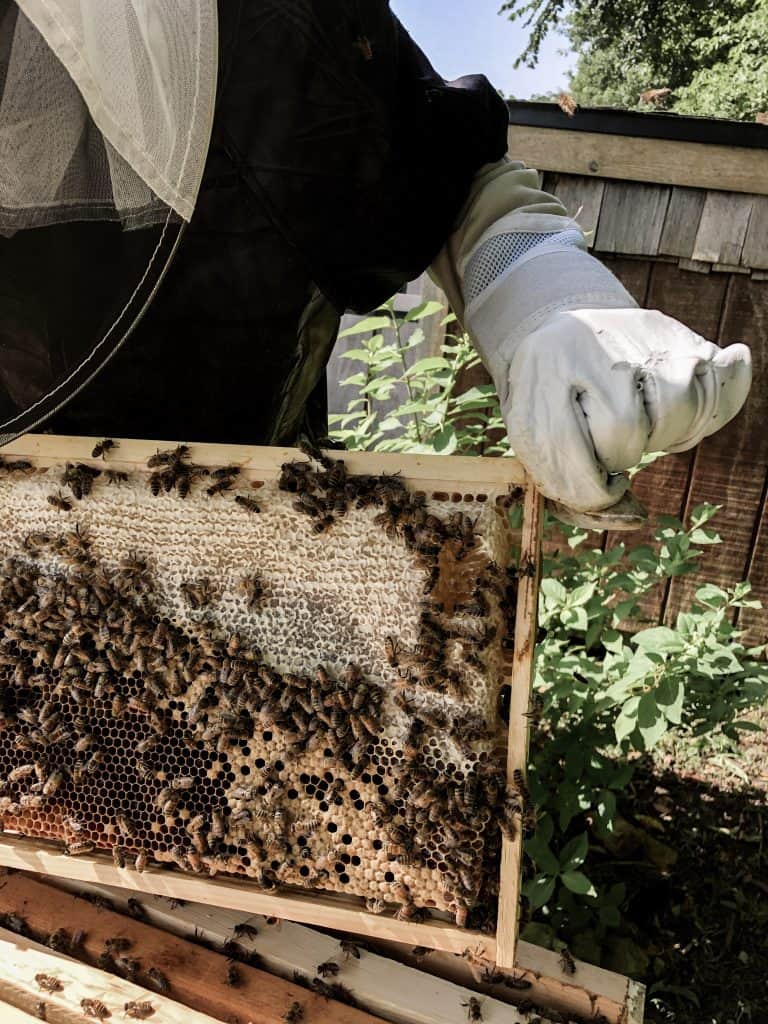
Backyard Beekeeping for Beginners – Develop Knowledge
There is a vast amount of information about backyard beekeeping for beginners. Books, magazines, online articles and classes are available to help you understand more about bees. You are caring for living creatures so, it is vitally important that you have an understanding of how to keep them healthy.
Find a bee mentor. I have several local mentors that I can call when I have a question. If you can find a local beekeeping group, many of them are willing to help answer

Best Beekeeping Books for Beginners
Honeybee Democracy
The Beekeepers Handbook
The Beekeepers Bible
The Practical Beekeeper
Backyard Beekeeping for Beginners – Where is the Best Location for a Beehive?
If you don’t have a good location for bees, you shouldn’t keep them. So, that brings up the question, “what is a good location for a beehive?” I have seen hives on rooftops, backyards, in fields, and even in subdivisions. You can put a hive in many locations but here are a few things to think about when placing your hives.
Bee Hive Placement Guide
- When placing a hive, the best direction for it to face is towards the East. This is so the morning sun will warm the hive and tell the bees that it is time for them to go out foraging. This gets them started working earlier in the day. Bees must have a body temperature around 95 degrees in order to fly.
- Think about the safety of you and those who may visit your home. Hives should be placed in a location that doesn’t get a lot of foot traffic.
- The hive should be placed with easy access in mind. When working a hive it is important that there is plenty of space around the backside of the hive to work. It is generally recommended to have at least 2-3 feet around the back of the hive.
- Hives should be placed on level ground. The boxes on the hive can weigh a lot so it is safest to have level ground to work on as you remove boxes to work the hive.
- A close water source is crucial in where a hive is placed. Bees collect water and are extremely efficient in where they go to get the water. They will choose the closest location to them.
- Wind barrier is an important factor in locations that get a lot of harsh winter weather or areas with heavy storms.
- Hives should be placed in an area where the bees have a clear entrance to enter and exit the hive.
- Check your local city ordinances. Some cities have ordinances that have to be followed if you want to be a beekeeper.
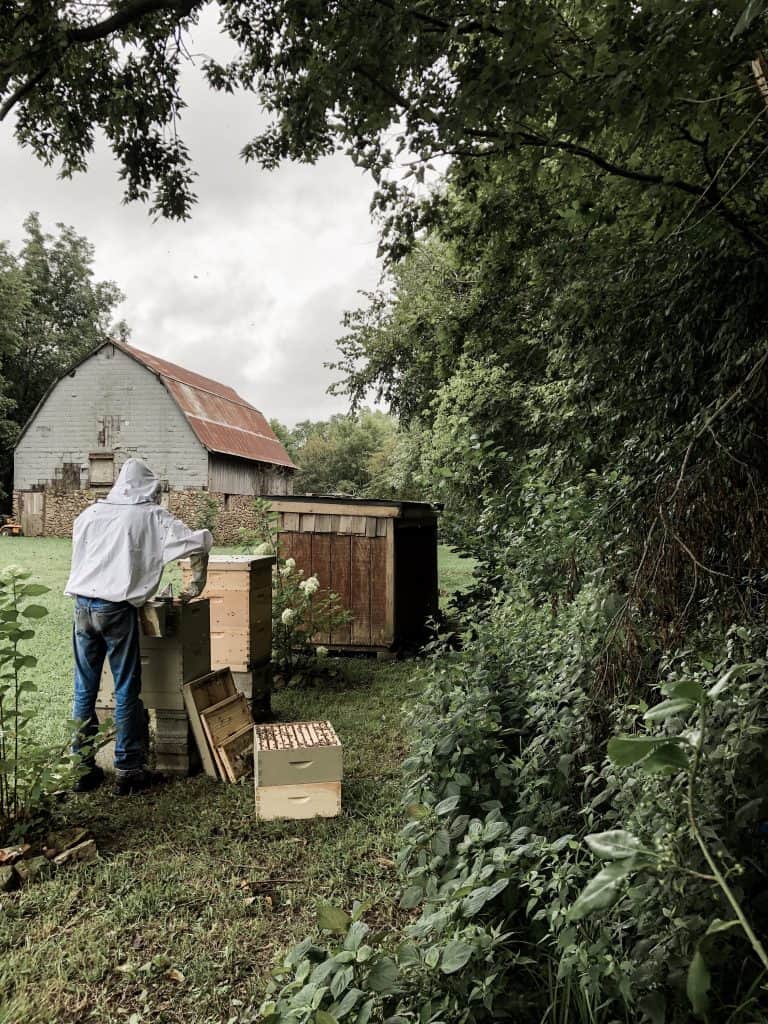
Beginner Beekeeping: When Should I Order Bees?
Spring is the ideal time to get bees. It is a wise idea to order bees early in the year, even as early as January. The bees will not arrive until April or May but you want to ensure that your order goes in early because often times there are limited amounts of bees that can be purchased.
Beginner Beekeeping: Where Can I Get Bees?
There are a variety of places that you can get bees. They can be ordered through the mail, purchased from a local farm store, purchased from a local beekeeper or you can even capture a swarm.
I chose to purchase my bees locally and here is my reasoning, the bees had already been acclimated to my area. This means that the bees had already survived the winter season here in Missouri and the hot summer. Also, since my bees only had to travel less than 10 miles, they didn’t undergo the stress of being shipped.
What Kind of Bees Should I Order?
Did you know that there is a variety of bees that you can purchase? Some options include Italians, Carniolans, and Russian Hybrids. Different varieties of bees will have distinctive traits. Factors like honey production, cold tolerance and how gentle the bees are will depend upon the variety you purchase.
Again, talking to local beekeepers to see what they may recommend for your area would be a good idea. The bees that I purchased came from a local beekeeper and I honestly never asked what kind they were. However, they are proficient honey makers and they are gentle.
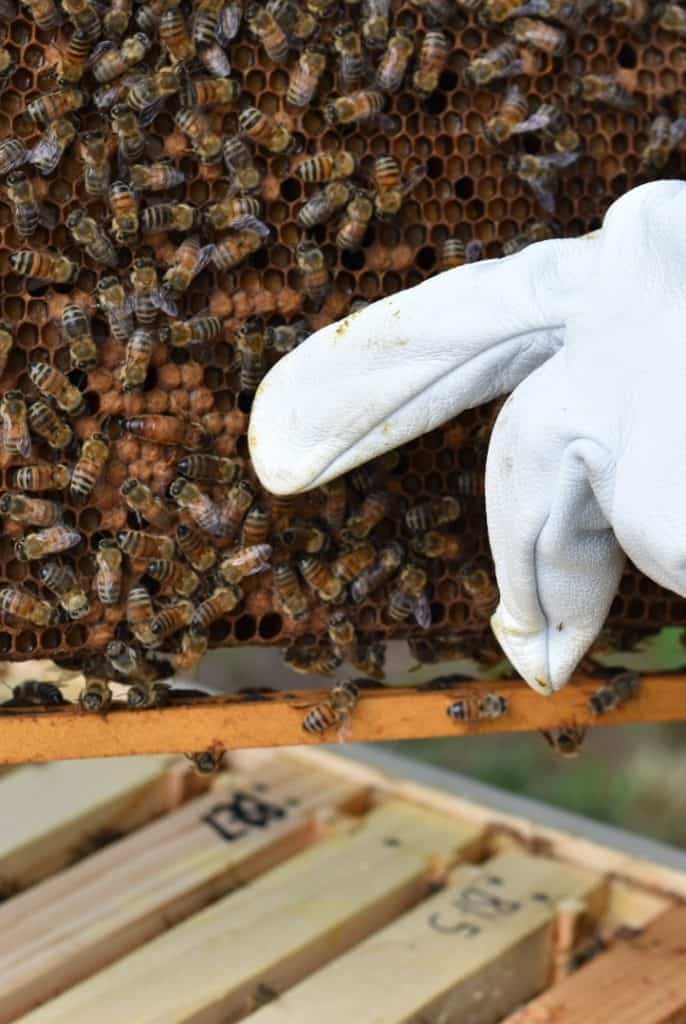
Should I Have the Queen Marked?
Another thing to consider is having your queen marked. While she looks different than the other bees if you are a beginner she may be hard to identify. When doing hive inspections, it is important to be aware of her location so that you don’t accidentally injure her.
How Much Do Bees Cost?
Beekeeping start-up cost can be costly but generally one can get into beekeeping for around $400 to $500 dollars for the bees, housing, and equipment. It is recommended to always start with two hives because with just one hive, you have nothing to compare it against to know if it is healthy and normal. I didn’t have the funds to start with two hives, so I relied upon several bee mentors to answer questions.
There are several initials factors that go into keeping bees.
- Housing for the bees. You have to have some sort of hive body to put them in.
- Honeybees: You will need to purchase bees.
- Essential Hive Equipment: These are the items that you will wear to protect yourself and the tools such as, a smoker, hive tool, etc.
- Hive Preparation: What you will sit the hive on and paint for the hive.
- Landscaping: Now this is not a necessity but I found that I wanted to make my bee area look pretty. So, I purchased Hydrangeas to plant and will be doing more in the future to make this area look aesthetic
a lly pleasing.
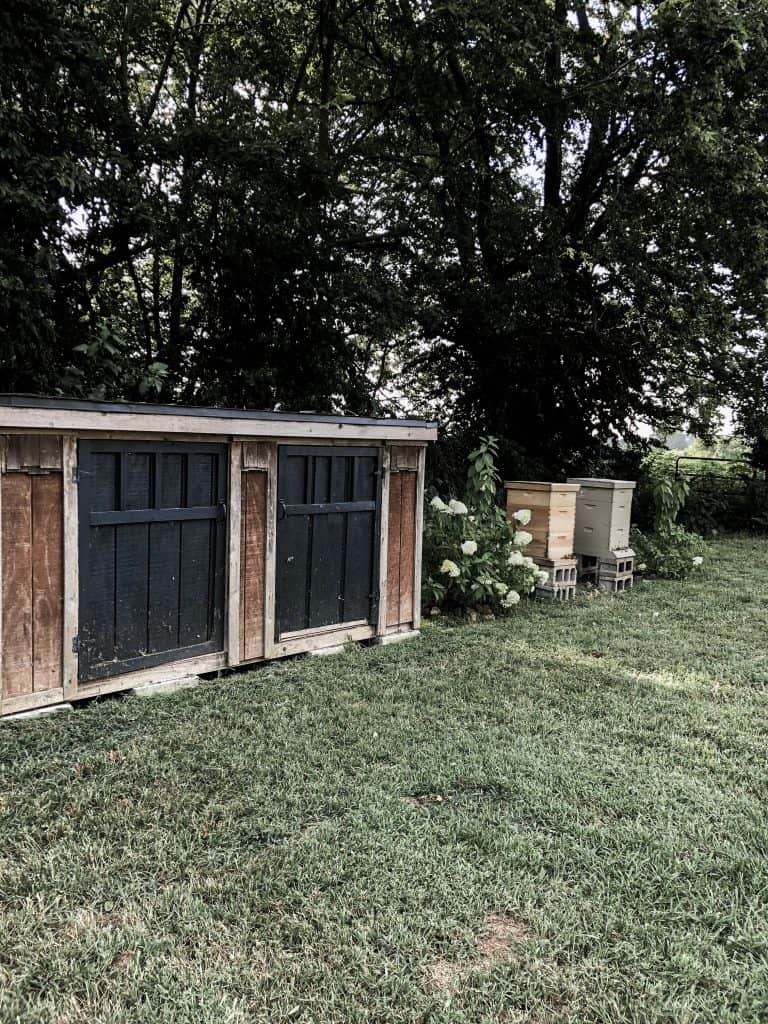
How Much Time Does it Take to be a Beekeeper?
The general time devoted to each hive would be about 20-30 hours per year. However, as you learn more about your bees you may find that you spend a lot more time watching them, going to meetings, talking about them and doing more research.
The world of beekeeping is a big world! I am so grateful that I finally took that step to become a beekeeper! It has become such an enjoyable hobby here on the farm farm, and getting honey is a big added benefit.

Future Backyard Beekeeping for Beginners Posts
I hope that you enjoy this backyard beekeeping for beginners series. Here are some future posts that I will be writing about so, be sure to subscribe to my newsletter!
- Common Beekeeping Terms You Need to Know
- Parts of a Hive
- How to Set up a Hive
- Installing a Nuc or Package of Bees
- Essential Equipment for Beekeeping
- How to Wire a Frame
- The Easiest Way to Start a Smoker
- Natural Beekeeping Methods
- The Easiest Way to Split a Hive

More Farm Related Posts
Backyard Farmhouse Chicken Coop
Landscape Gardening Around the Chicken Coop

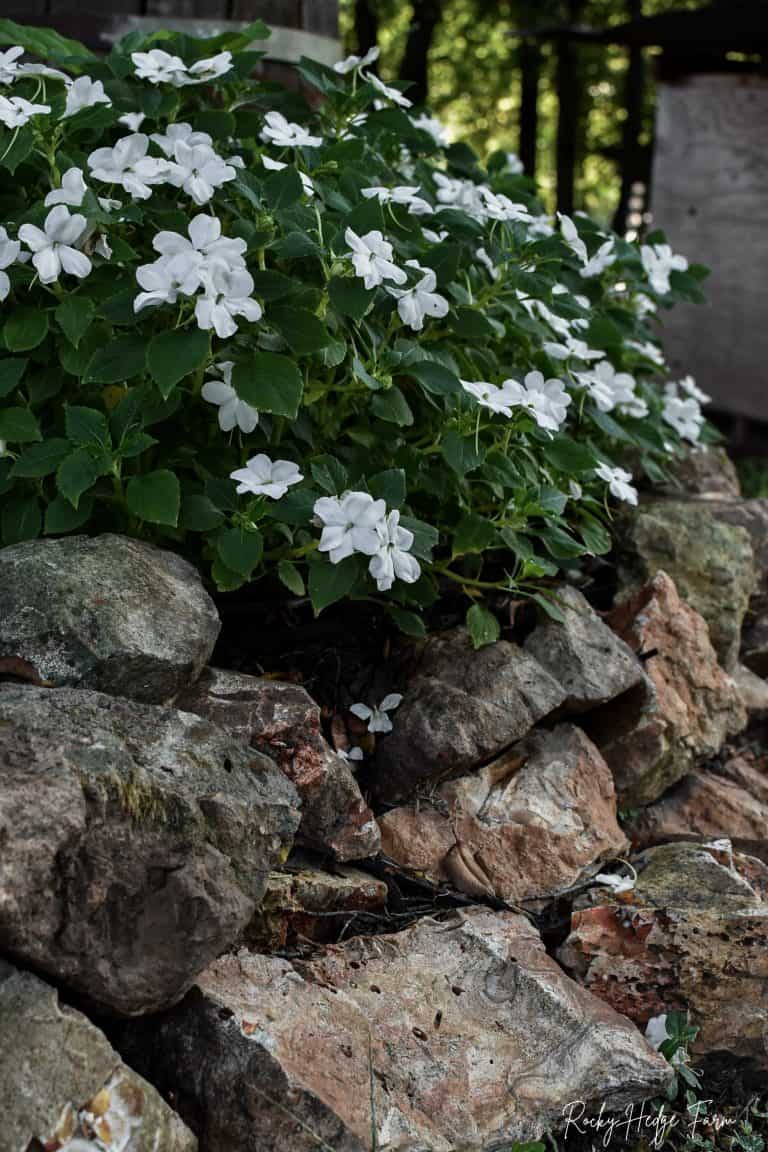

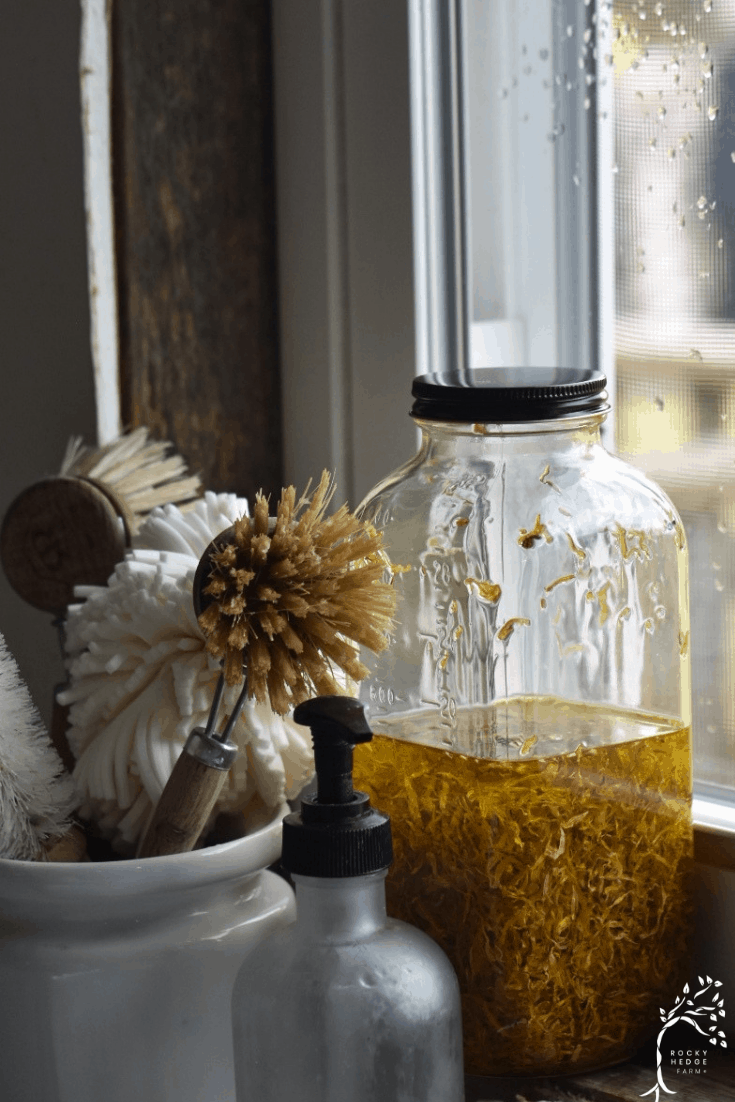
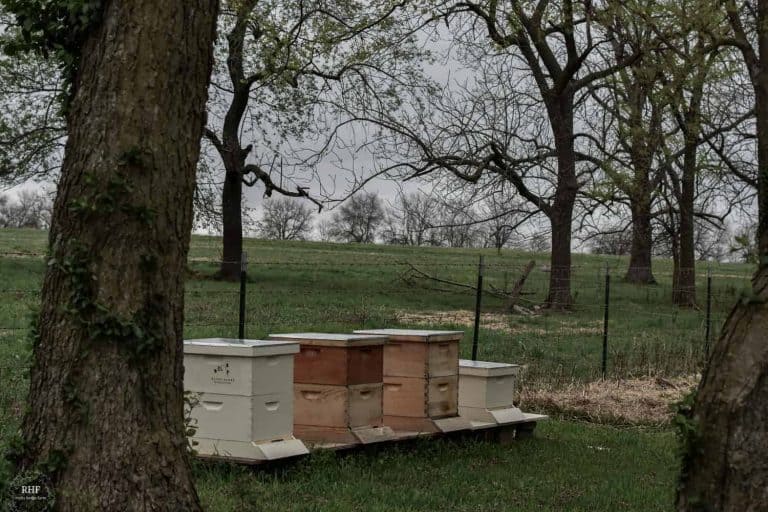


I have often wondered why more people don’t have bee hives if they own enough land and are also gardeners. You natural pollinators besides honey. I guess it has always been a dream of mine. I do have a question about your bees. I was wondering what you did to get your honey? Do you take it to someone who has a special machine for that, or do you have to buy something special for that? Also, if you remove the honey, doesn’t that hurt how the bees get their food? Yes, I am a city girl and no absolutely nothing about any of this.
Did you just google locations close to you that sale bees? I live in MO as well and have been trying to find a good place to order them from.
I began asking around – start with your local farm stores as they potentially know someone who does beekeeping. Then, you can start making those connections as to where to get the bees. We have several local beekeepers in the Springfield/Joplin area. I am not sure where you are located but hopefully, you can find someone that sells them.
I really appreciate the information contained in this post, and I’ll be glad to hear more about your suggestion for people like me that wants to start been 🐝 farming. Thanks so much 🙏